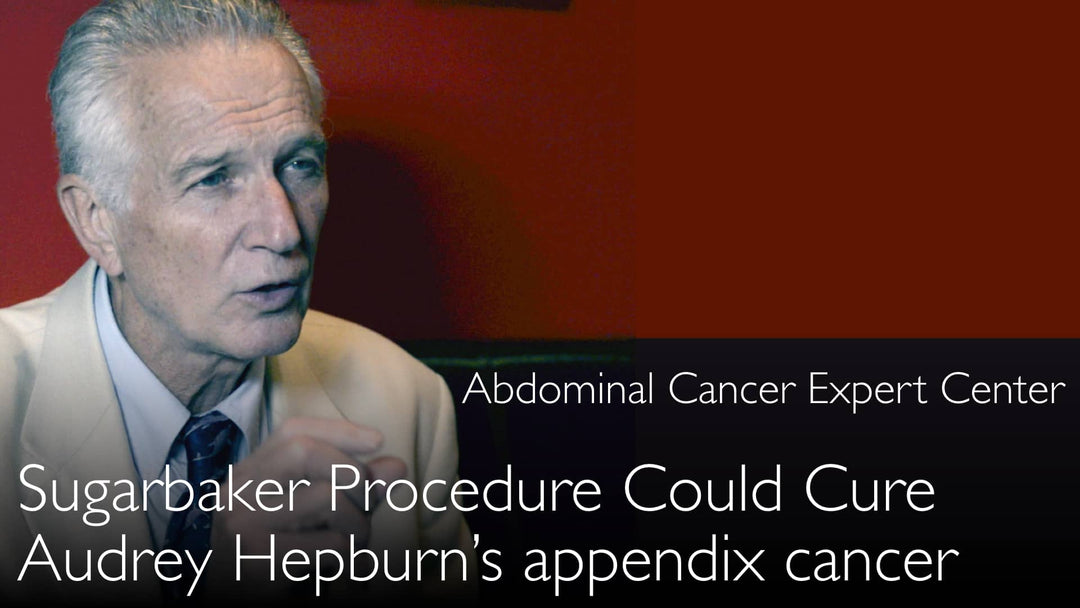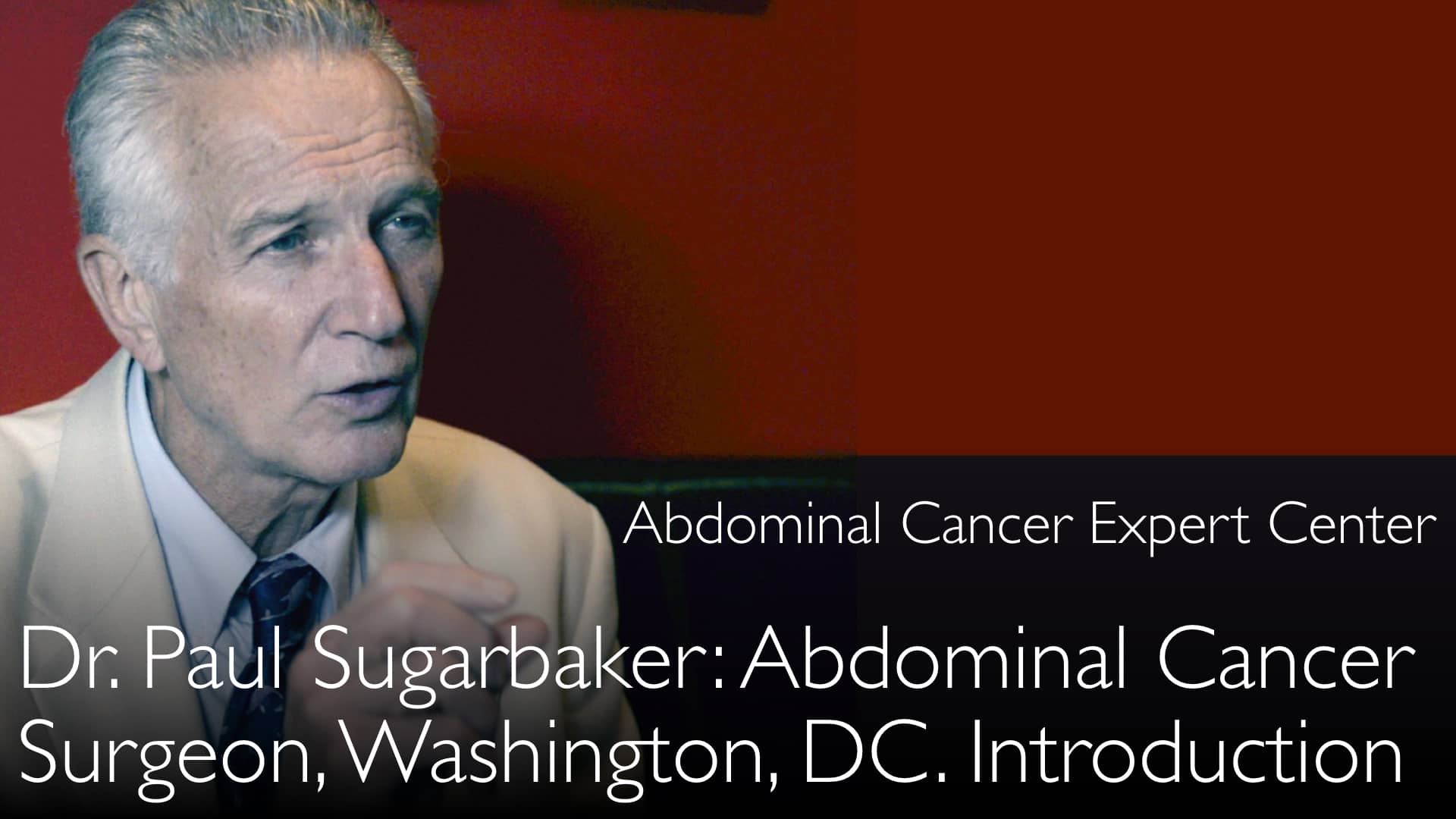Leading expert in peritoneal surface malignancies, Dr. Paul Sugarbaker, MD, explains how modern treatments can cure appendix cancer. Actress Audrey Hepburn died from this disease in 1992. Today, the Sugarbaker Procedure offers a potential cure. This treatment combines cytoreductive surgery with heated intraperitoneal chemotherapy. Up to 70% of appendiceal cancer patients are now cured. A medical second opinion is crucial for confirming this advanced diagnosis.
Modern Cure for Advanced Appendix Cancer and Peritoneal Metastases
Jump To Section
- Audrey Hepburn's Appendix Cancer Today
- The Sugarbaker Procedure Explained
- Cytoreductive Surgery and HIPEC
- Appendix Cancer Cure Rates
- Importance of a Medical Second Opinion
- Full Transcript
Audrey Hepburn's Appendix Cancer Today
Dr. Paul Sugarbaker, MD, discusses the tragic case of actress Audrey Hepburn. She died from metastatic appendiceal cancer in 1992. At that time, effective treatment for peritoneal spread was not available. Dr. Anton Titov, MD, highlights how her outcome would be different today. Modern peritoneal surface malignancy programs did not exist then. Now, specialized centers offer sophisticated treatment options for this condition.
Dr. Paul Sugarbaker, MD, notes that the extent of Hepburn's cancer is unknown. However, he states she would undoubtedly be a candidate for modern therapy. The smaller the extent of cancer spread, the higher the likelihood of treatment success. This makes early and accurate diagnosis critical for a positive prognosis.
The Sugarbaker Procedure Explained
The Sugarbaker Procedure is a landmark treatment for cancers that spread within the abdominal cavity. Dr. Paul Sugarbaker, MD, emphasizes it was a combined international effort. Surgeons from Japan, France, and the United States contributed to its development. This collaborative work created a strategy to combat peritoneal metastases effectively.
The procedure specifically targets cancers like appendiceal cancer and pseudomyxoma peritonei. It addresses tumors that were once deemed universally fatal and inoperable. Dr. Anton Titov, MD, notes this represents a paradigm shift in oncology. It provides hope where there was previously none.
Cytoreductive Surgery and HIPEC
The core of the treatment is a two-step process. First, surgeons perform cytoreductive surgery. This operation aims to remove all visible tumor deposits from the abdominal cavity. It is a meticulous and complex surgical procedure.
Second, surgeons administer Hyperthermic Intraperitoneal Chemotherapy (HIPEC). This is a heated chemotherapy bath applied directly inside the abdomen. The heat enhances the chemotherapy's cancer-killing power. This regional approach targets microscopic disease left behind after surgery. Dr. Paul Sugarbaker, MD, confirms this is the standard of care today for eligible patients.
Appendix Cancer Cure Rates
The success rates for this combined treatment are remarkably high. Dr. Paul Sugarbaker, MD, states that up to 70% of appendiceal malignancy cases are now cured. This is a monumental improvement from a time when the disease was almost always fatal. The prognosis depends on the cancer's aggressiveness and the extent of spread.
Less aggressive appendix cancers have the best outcomes. Dr. Anton Titov, MD, underscores that this is the biggest success story in treating peritoneal metastases. This high cure rate makes seeking expert care and a thorough evaluation essential.
Importance of a Medical Second Opinion
Obtaining a medical second opinion is a critical step for patients. Dr. Anton Titov, MD, frequently discusses its value in complex cancer cases. A second opinion can confirm an advanced appendix cancer or pseudomyxoma peritonei diagnosis. It also verifies that a patient is a candidate for potentially curative surgery.
Dr. Paul Sugarbaker, MD, represents the type of specialized expertise patients should seek. A second opinion ensures access to precision medicine treatments like cytoreductive surgery and HIPEC. It is the best way to explore all modern treatment options for stage 4 cancer with peritoneal metastases.
Full Transcript
Actress Audrey Hepburn could have survived her appendiceal cancer today. Renowned Harvard-trained American cancer surgeon Dr. Paul Sugarbaker explains.
Audrey Hepburn died in 1992 from metastatic cancer of the appendix. It spread along the peritoneal cavity in the abdomen. Today, 23 years later, the Sugarbaker Procedure is used successfully to treat appendiceal cancer and pseudomyxoma peritonei.
Audrey Hepburn's appendix cancer could be cured today. She would have had cytoreductive surgery and hyperthermic intraperitoneal chemotherapy (HIPEC), a hot chemo bath, heated chemotherapy today.
Dr. Paul Sugarbaker, MD: Cytoreductive surgery is an effective treatment for appendiceal cancer. 70% of appendiceal malignancies are cured with cytoreductive surgery and HIPEC.
Appendiceal cancer spread in the abdomen and peritoneal cavity. Peritoneal metastases in advanced stage 4 pseudomyxoma peritonei are treated by cytoreductive surgery and hyperthermic intraperitoneal chemotherapy (HIPEC), hot chemo bath, heated chemotherapy.
Medical second opinion clarifies appendix cancer diagnosis.
Dr. Paul Sugarbaker, MD: Medical second opinion confirms that cure is possible in metastatic appendiceal cancer. Intraperitoneal chemotherapy treats advanced stage 4 cancer with metastatic lesions in the abdomen.
Medical second opinion helps to select a precision medicine treatment for stage 4 appendix cancer or stage 4 pseudomyxoma peritonei. Get a medical second opinion on advanced cancer with peritoneal metastases.
Best peritoneal metastatic advanced cancer treatment is by surgical operation and regional chemotherapy. Video interview with Dr. Paul Sugarbaker.
Dr. Paul Sugarbaker, MD: Leading expert in peritoneal metastatic cancer treatment. Cytoreductive surgery and hyperthermic intraperitoneal chemotherapy (HIPEC), hot chemo bath, heated chemotherapy.
Audrey Hepburn's appendix cancer could be cured today.
Dr. Anton Titov, MD: Let's speak about appendiceal cancer, the cancer of the appendix. Movie star Audrey Hepburn had appendix cancer, not colon cancer. Perhaps if Audrey Hepburn was treated in your hands in modern times, her life would have been significantly extended. Could Audrey Hepburn's appendix cancer have been successfully treated by the Sugarbaker Procedure that you developed?
Dr. Paul Sugarbaker, MD: Audrey Hepburn died several decades ago. She was treated at Cedars Sinai Hospital in Los Angeles. They did not have a peritoneal surface oncology group there. Now they have a quite sophisticated peritoneal cancer treatment program.
Audrey Hepburn would have had cytoreductive cancer surgery. She also almost undoubtedly would have had HIPEC as part of her cancer treatment today.
I actually don't know what the extent of Audrey Hepburn's appendix cancer was. The smaller the extent of cancer spread in the peritoneum, the more likely we are to achieve success in cancer treatment.
Less aggressive appendiceal cancer malignancies are more successfully treated than the more aggressive or more invasive appendix cancers.
I don't know the details of Audrey Hepburn's clinical situation. But I would imagine she could be cured at this point in time. Because a large number of appendiceal malignancies are cured with cytoreductive surgery and HIPEC.
That is a huge change, because all those people with appendix cancer used to die. Now up to 70% of appendix cancer cases are cured with cytoreductive surgery and HIPEC. The biggest success story is appendix cancer.
Dr. Anton Titov, MD: Audrey Hepburn died in 1992. 20+ years later, essentially all these types of cancer can be cured with the Sugarbaker Procedure. You developed the treatment for peritoneal malignancy and peritoneal cancer spread.
Dr. Paul Sugarbaker, MD: Previously many peritoneal cancer cases were deemed inoperable at the time. For example, appendix cancer that Audrey Hepburn had.
I say "we developed" because development of the Sugarbaker Procedure was a combined effort by surgeons from Japan, France, and the United States. The Sugarbaker Procedure is a combined effort putting together these strategies to treat peritoneal spread of cancer.
Audrey Hepburn's appendix cancer could be cured today by the Sugarbaker Procedure: cytoreductive surgery and hyperthermic intraperitoneal chemotherapy HIPEC.





